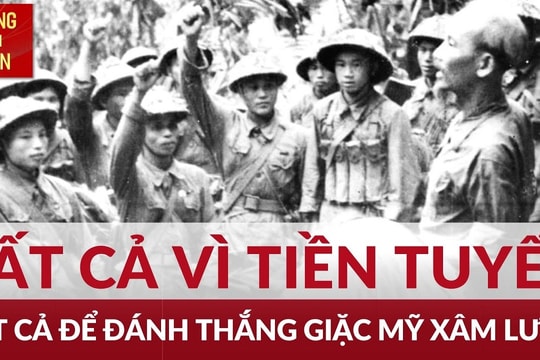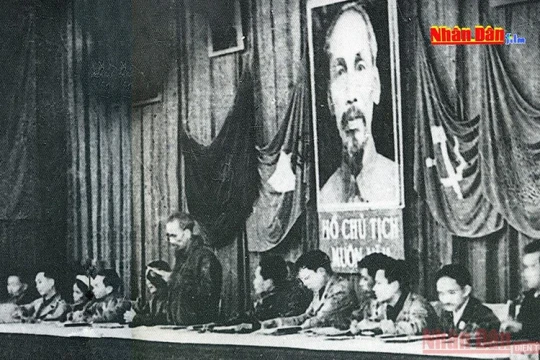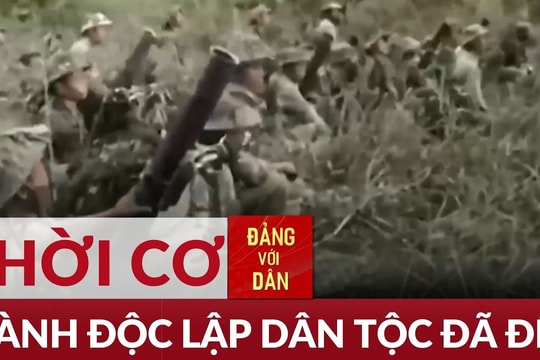Some stories about Uncle Ho and journalists
With the founding of Le Paria newspaper in 1922, Thanh Nien in 1925 and many other newspapers; with the establishment of goals and principles of revolutionary journalism, taking care of team building..., President Ho Chi Minh was the founder and teacher of Vietnam's revolutionary journalism. He was also a father and a loving colleague...
.png)
Nguyen Si Dai• June 4, 2025

On his journey to find a way to save the country, Uncle Ho also found a sharp weapon to denounce imperialism, mobilize and gather the masses, a weapon without which there is no guarantee for the revolution to succeed. That is journalism. He persevered in learning journalism from his fellow countrymen who went to France before, such as Phan Van Truong, to great writers and journalists such as Henri Barbutus, Leo Tolstoy, Roman Rolan, Gaston Monmousseau, Jean Longuet - grandson of Karl Marx, and became an effective collaborator of the newspaper L'Humanité under the editorship of Marcel Cachin.
He founded many newspapers and held the official position of journalist for several foreign newspapers. In a letter dated November 12, 1924, he informed the Communist International that he had arrived in China, with a contact address of Mr. Lou (Lu), Roxta News Agency, Guangzhou, China.
In June 1940, the Party organization in the country sent comrades Pham Van Dong and Vo Nguyen Giap to Kunming to meet Uncle Ho. Here, Uncle Ho gave those comrades the name card "Ho Chi Minh, Tan Thanh Nhat Bao journalist".
On August 27, 1942, Uncle Ho was arrested by Chiang Kai-shek's government in Suc Vinh. In his pocket was a card with the name Ho Chi Minh, a member of the "Chinese Youth Journalists Association".
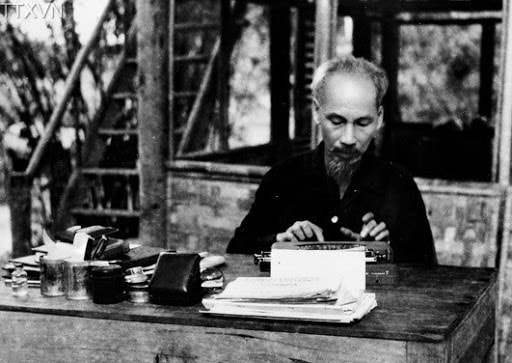
All of Uncle Ho's most important thoughts and personality were expressed in the press for the entire nation and the world to know; from "The indigenous peoples' problem in Indochina" (August 2, 1919), "Colonial mentality", "Demands of the Annamese people" in the early period to the last articles "Promoting revolutionary morality, wiping out individualism" (Nhan Dan Newspaper, February 3, 1969), "Promoting responsibility for caring for and educating teenagers and children" (Nhan Dan Newspaper, June 1, 1969).
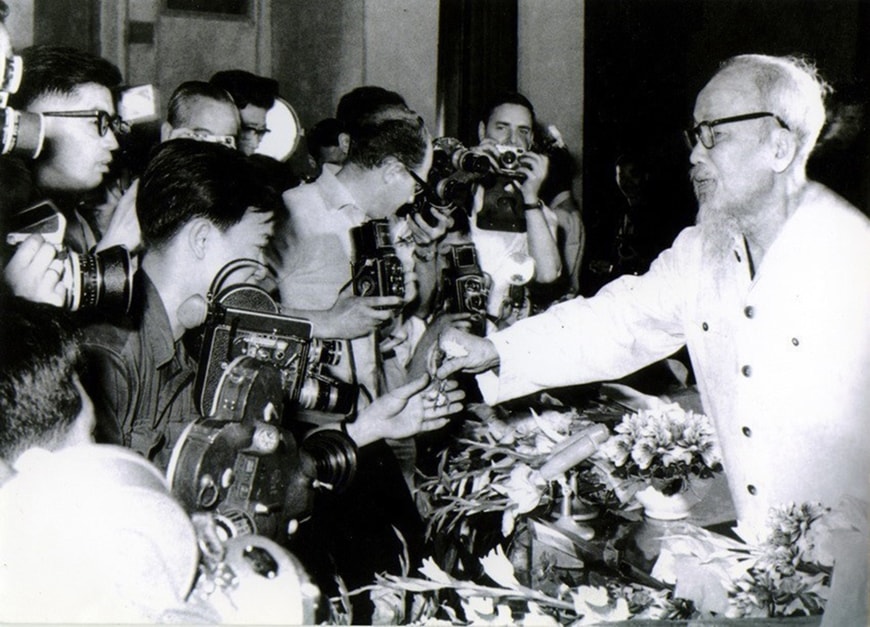
In the January 21, 1946 issue of the National Salvation Newspaper, Uncle Ho published an interview with foreign journalists in which he spoke very deeply about himself and the Party:
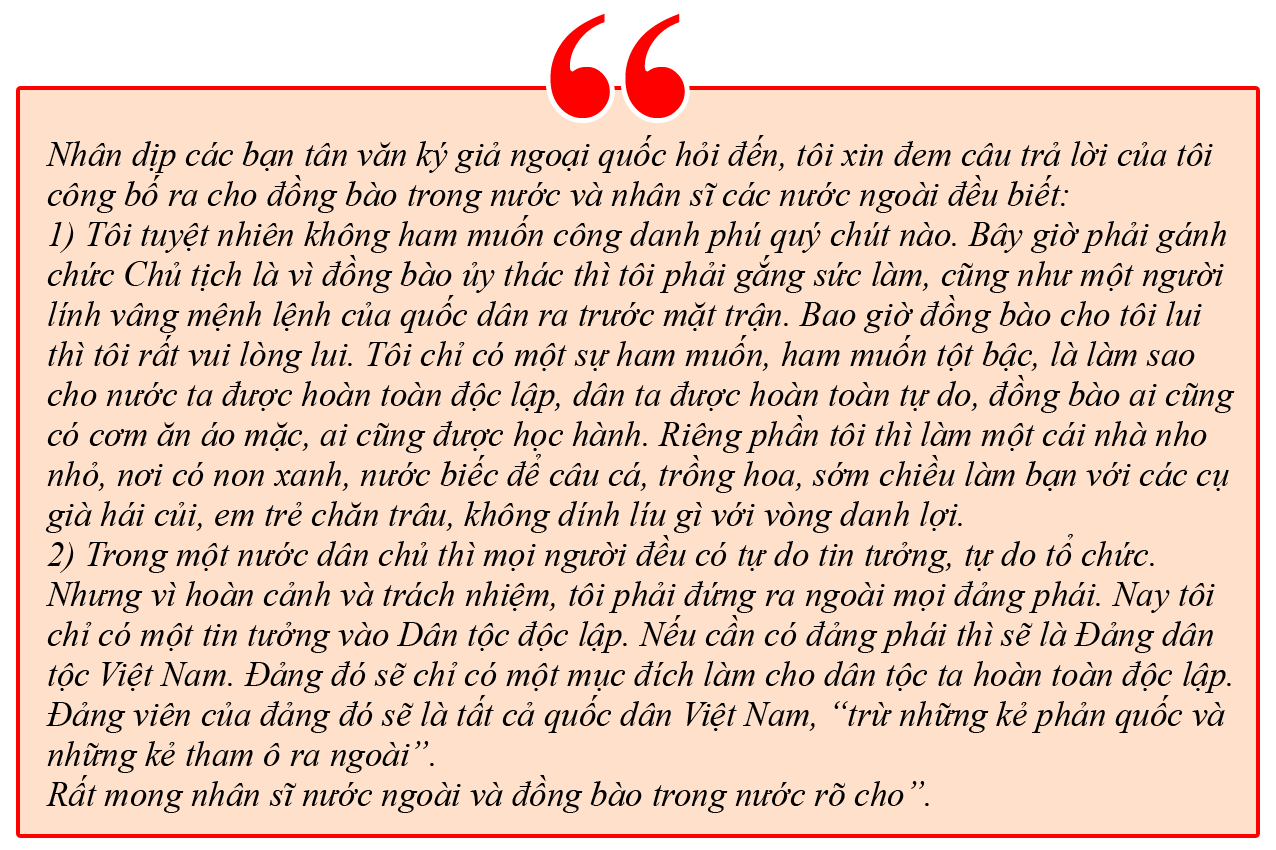
The greatness of Uncle Ho reflected the greatness of the entire nation. Foreign journalists felt that when they met and interviewed him.
Boc-set said: “When I asked him: “Where is the President's office?”, the answer surprised me: “When it's dark, it's on the porch, when it rains, it's in the bedroom.”
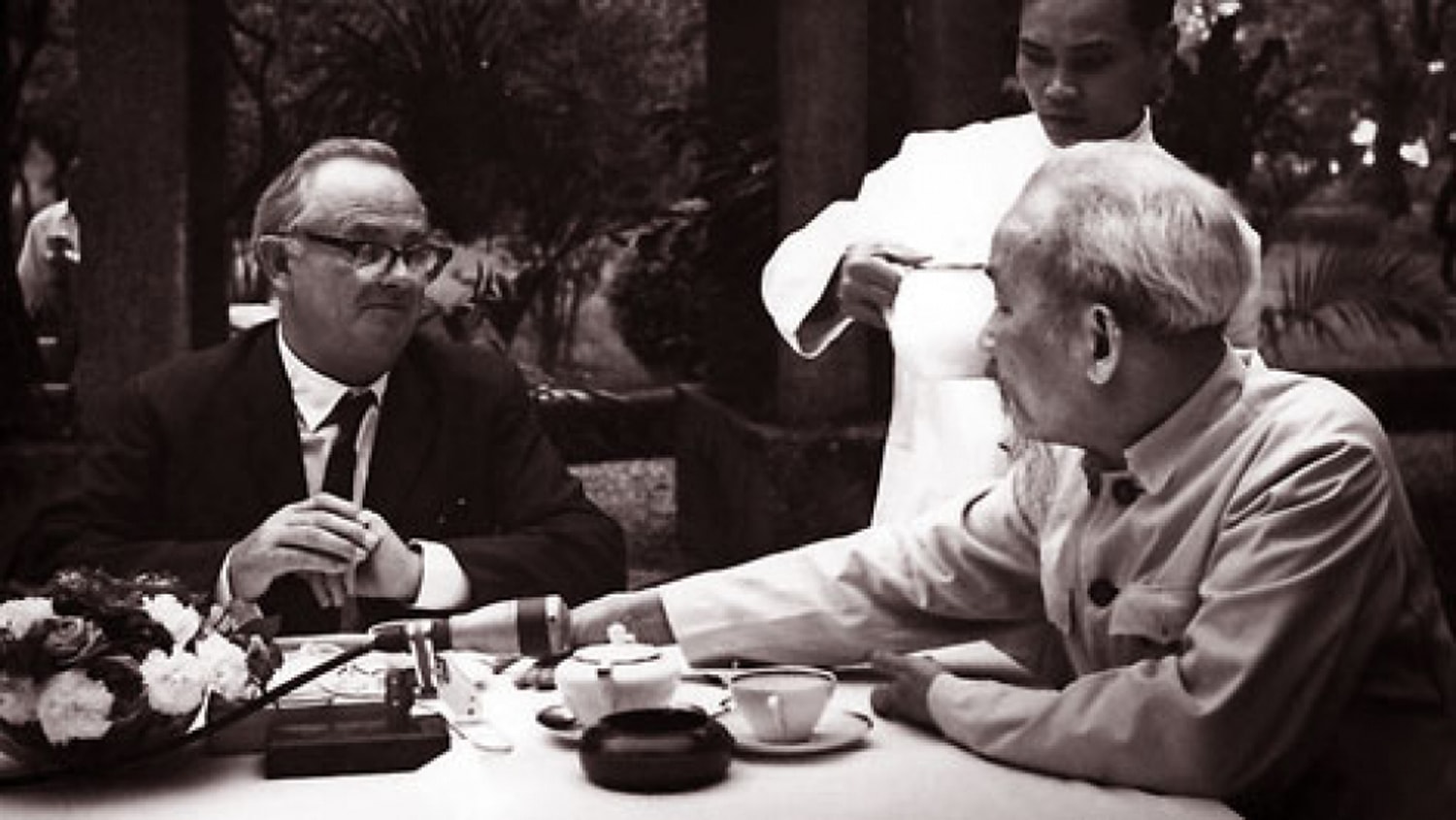
A female reporter from the Office of French Radio and Television (ORTF), in an interview at the Presidential Palace on June 5, 1964 (exactly 2 months before the US bombed the North), raised many difficult questions. This female journalist was a Westerner, probably sent to probe and manipulate; while Uncle Ho "countered the enemy" to propagate and send messages to France and the US.
When the reporter asked: “Are the Vietnamese afraid if the US waged war in the North?”, Uncle Ho immediately replied: “No, we are not afraid. The French know that, fear does not exist in us”!
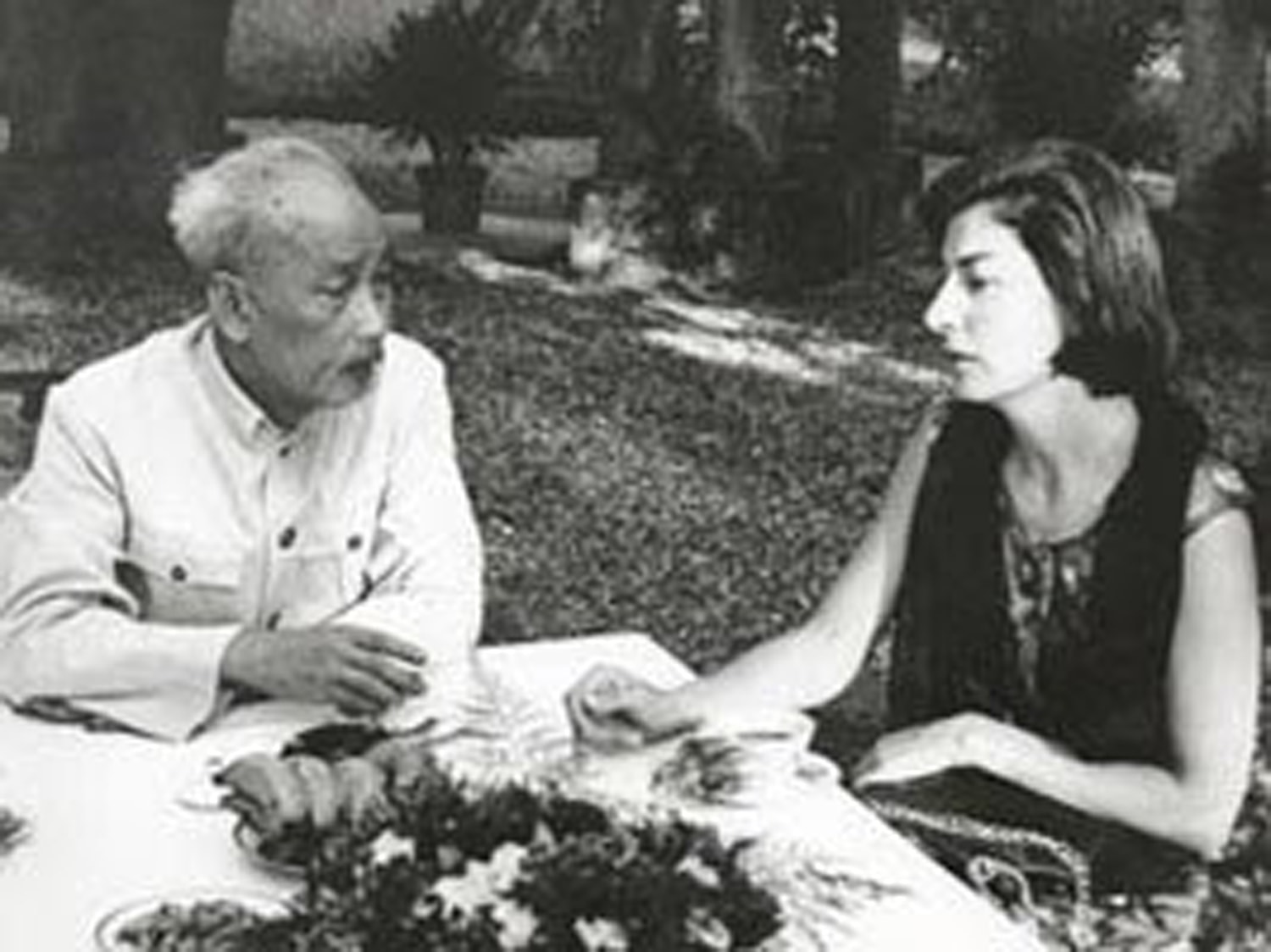

During the resistance war against the French, the film crew of director Pham Van Khoa, cameraman Mai Loc, and Nguyen Tien Loi wanted to film a government meeting but there was no electricity and the house was too dark. While they were struggling, Uncle Ho suggested and allowed them to temporarily remove some leaves on the roof to get some light. The light from above made the image even more artistic.
Journalist Le Viet Thao (VNTTX) was sent to write about Uncle Ho's visit to Viet Hung commune, Gia Lam on the morning of the first day of the Lunar New Year 1958. Before that, he carefully prepared documents, then followed Uncle Ho closely and took detailed notes. When he returned home, he immediately wrote a long report and sent it to the President's Office. Then, Uncle Ho called him up. He was very nervous, waiting for Uncle Ho to praise him. Unexpectedly, Uncle Ho crossed out many places in the article. Uncle Ho said: When visiting the people, there were also other Party and State leaders, but you only wrote about Uncle Ho, so you are being too "greedy". You only wrote about Uncle Ho, but Ms. Nguyen Thi Mo, the commune secretary, spoke so well about the hard-working farmers who worked hard all year round, so you didn't write about it, that's unfair! Le Viet Thao received a profound lifelong lesson about the masses and respect for the people.
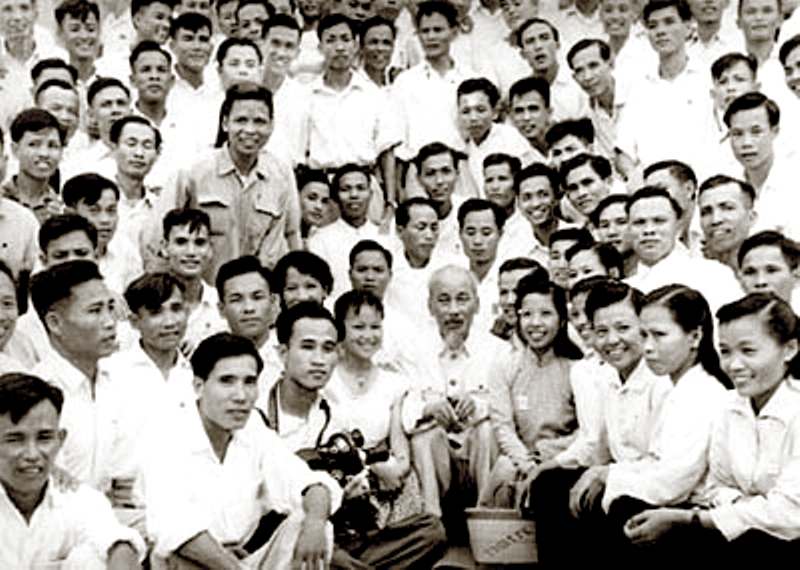
Reporter Phan Quang (Nhan Dan Newspaper) accompanied Uncle Ho on many trips. Once, when he returned to Bac Hung Hai, he wrote an article describing in detail the story of Uncle Ho walking in the fields, and was criticized by Uncle Ho. His story was no different from everyone else's, so why did he have to tell it?
But once, he wrote an investigation about the agricultural production situation in Thanh Hoa province, stating that the production situation here had many negative aspects, because "the leaders of Quang Xuong district were busy with work and meetings", "The Provincial Party Committee member in charge of the Provincial Farmers' Association, during his six months in office, had not signed any documents directing work, except for two or three times coming to read the opening speech at the conference...".
Thanh Hoa reacted strongly, a leader said: "Strange, a young reporter with a fresh face dares to write an article criticizing the largest province in the country like Thanh Hoa". While we were worried, on July 4, 1955, Nhan Dan Newspaper published an article: "If there is criticism, there must be self-criticism" by HB, clearly stating: "There are many criticisms that have been brought up in the newspaper but no agencies or localities with problems have spoken up, such as the article criticizing Thanh Hoa Provincial Party Committee for underestimating production leadership, Hanoi Railway Station for wasteful phenomena...". HB is Uncle Ho's pen name, so he escaped! Phan Quang concluded: All my life I have learned from Uncle Ho in 11 words:Who to write for, what to write for, and thenhow to write.
During a meeting between Uncle Ho and foreign guests in the garden of the Presidential Palace, female journalist Hoang Tuong Van gradually moved closer to Uncle Ho. Seeing the reporter's anxious expression, Uncle Ho asked: "Miss Van, are you asking for documents? Let me get them for you."
Uncle Ho read the welcome message. The representative of the international delegation responded. After that, Uncle Ho bowed his head and whispered to the guest and asked for the document to be given to the reporter. Any female reporter received special attention from Uncle Ho.
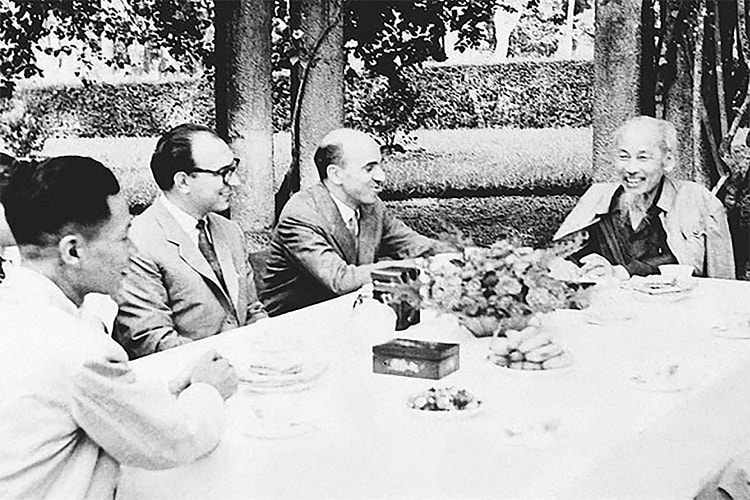
Journalist Dinh Chuong (VNTTX) is a reporter who specializes in writing about Uncle Ho, and was taught and edited by him the most. When visiting An Khanh Military Farm, the reporter wrote, "It is necessary to clearly define that any labor, whether in a factory, farm, or in the countryside, is glorious." Uncle Ho changed it to: "It is necessary to clearly define that any labor that benefits the country and the people is glorious." More concise and clearer in its content of benefiting the country and the people.
Dinh Chuong wrote a news article titled: “Chinese art troupe pays respect to President Ho.” Uncle Ho changed it to: “President Ho receives Chinese art troupe” and explained: This troupe was sent by the Party, Government, and people of China, so Uncle had to represent the Party, Government, and people of Vietnam to receive the troupe. Writing it short is good, but using an incorrect abbreviation is not acceptable.
A newspaper published an article entitled “Against President Ho’s Individualism”. Uncle Ho called the editor-in-chief of that newspaper and asked: “What is my individualism like? Please criticize it so that I can correct it. If I do not have the disease of individualism, you must correct it to “Against the individualism that President Ho has mentioned”.
On April 27, 1969, Uncle Ho went to vote for the Ba Dinh Ward People's Council, term V, in constituency number 1, sub-region 1. When Uncle Ho entered room number 3 to write ballot, reporters, especially film and photo reporters like Ma Cuong and Vu Tin, rushed after him. Uncle Ho quickly covered the ballot, turned around and sternly said: "What are you doing? No one is allowed in here! Don't you know the principle of secret ballot?". That was a lifelong lesson, ensuring all principles when working in journalism.
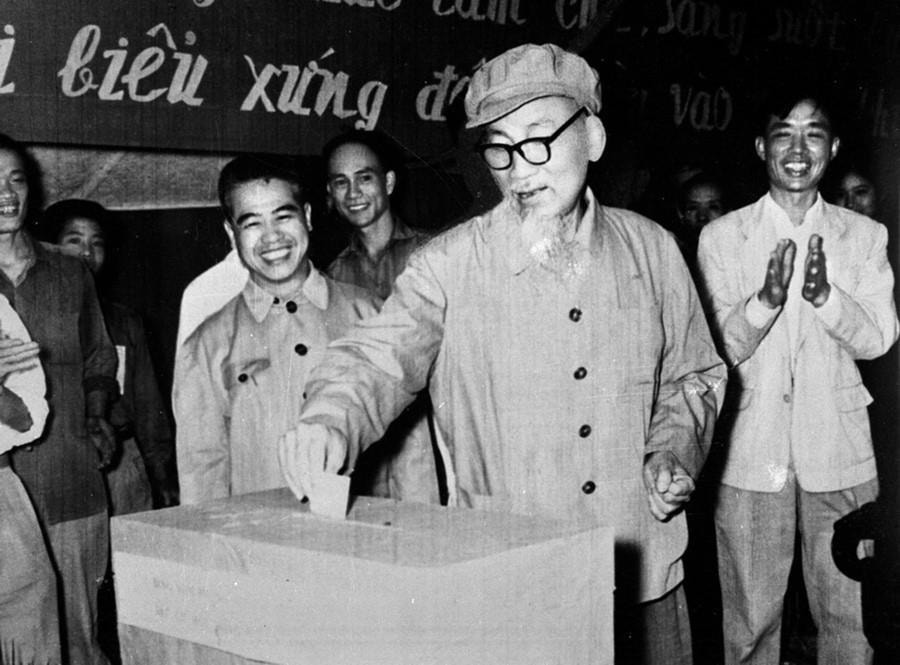
However, in other cases, Uncle Ho was very gentle. That same time, after writing the ballot, Uncle Ho leisurely went to the ballot box. While admiring Uncle Ho, VNA reporter Vu Tin fumbled and did not have time to get the distance, causing the flash cord to slip out. He pressed the button but the light did not turn on. After Uncle Ho voted, he was able to plug the flash cord back in... Too scared because he had not completed his task, Uncle Ho turned to ask: "The light is not on, child?" The whole room burst into laughter. Uncle Ho returned to the ballot box, made a voting gesture and then patted it a few times, enough for the reporter to record...
In the fall of 1962, Uncle Ho went to China. Comrade Tran Ngoc Kien, Military Attaché of our Embassy, told Le Tu Vinh, resident reporter of VNA in Beijing: I came from the South and have never had a photo taken with Uncle Ho. On this occasion, please try to take a photo for me as a lifelong memory. Mr. Vinh was very worried, wondering if Uncle Ho would agree. When Uncle Ho happily received Mr. Kien, seeing Uncle Ho's beautiful smile, Mr. Vinh stepped back, took out his camera and quickly took a photo. The old Rollei camera made a very loud clicking sound, making Mr. Vinh sweat profusely. Seeing Uncle Ho talking calmly as if nothing was happening, "going with it", he adjusted it carefully and took another photo. After the second "click", Uncle Ho turned back and gently asked: "Are you sure?" It turned out that Uncle Ho had known everything from the beginning and calmly created conditions for the reporter to work.
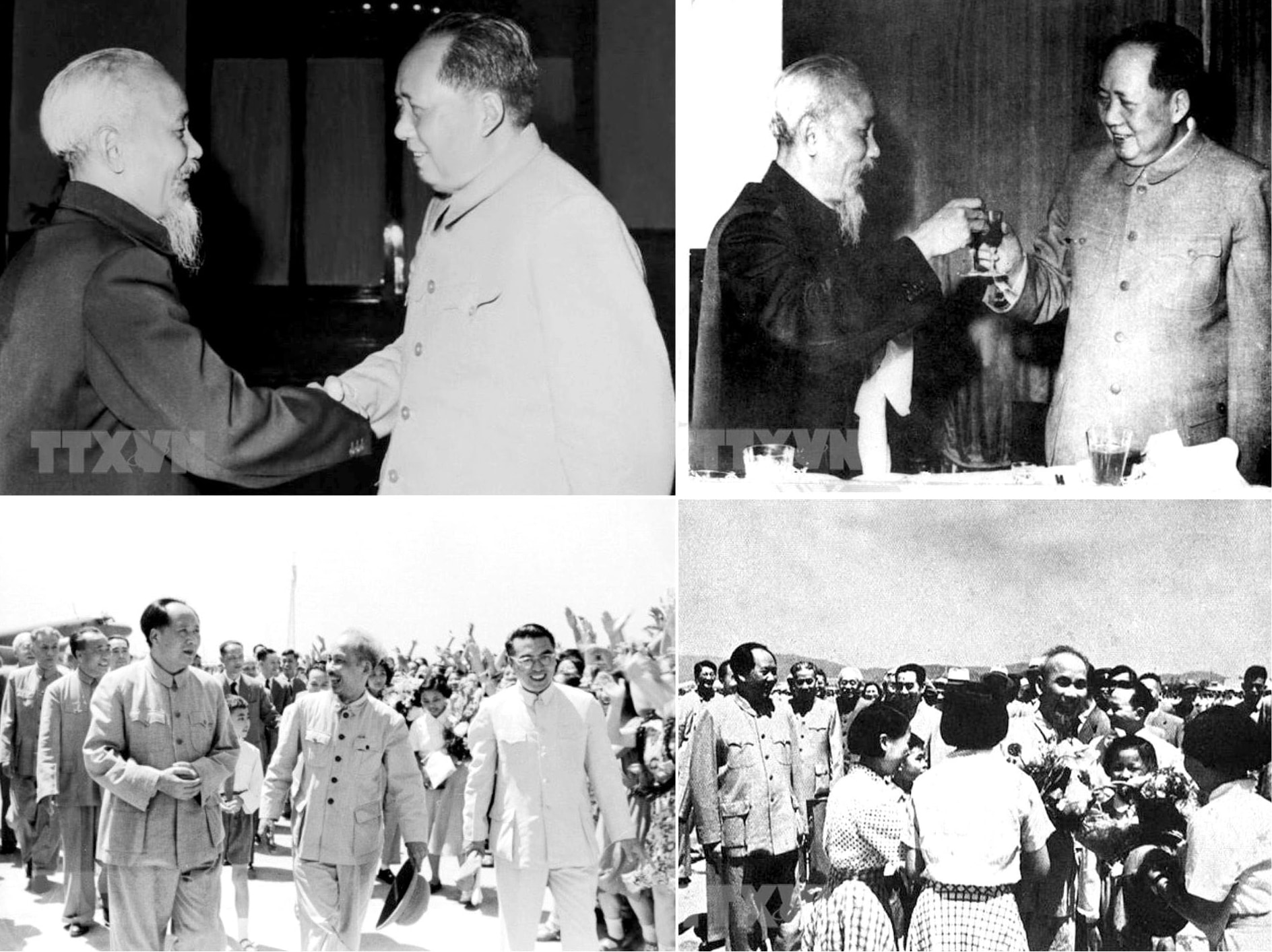
In 1959, the delegation of the State Party of the German Democratic Republic was led by Chancellor Otto Gevoldov. Journalist Le Viet Thao's pen was clogged with ink. Uncle Ho passed by and said softly: "The pen is clogged with ink, isn't it miserable? If anyone has a pen, please send emergency support to journalists." Like a student caught making a mistake, Mr. Thao stood rooted to the spot. Uncle Ho gently said: "When going to battle, weapons must be ready, at least two fountain pens, a sharpened pencil, and a pocket knife."

On February 15, 1965, Uncle Ho visited Hong Thai Cooperative, Ninh Giang District, Hai Duong Province, the leading flag of the Northern irrigation movement, and Nam Chinh Commune, Nam Sach District, where the disease prevention and sanitation movement was the best in the province.
People visit some historical sites and burn incense at Hun Pagoda, whose Chinese name is "Thien Tu Phuc Tu" and was built in the 10th century, where monk Huyen Quang once practiced and Nguyen Trai once held the position of Head of the Pagoda (De nominated Con Son Tu Phuc Tu).

According to VNTTX journalist Me Hung Doan, Uncle read the stele "Con Son Tu Phuc Tu Bi" and explained it to everyone and asked what was on the top of Con Son mountain. Fearing that Uncle would be tired, Hai Duong Secretary Nguyen Chuong invited Uncle to the guest house. Some comrades said that there were only dry streams, dry trees, and bumpy mountain roads. Another comrade said that there were cool streams, pine forests, and chessboards, places where Nguyen Trai often fished, read books, and recited poems. Uncle listened and smiled. The whole group did not eat the provincial meal but ate sticky rice served by the temple. As for Uncle, he opened the rice ball to eat and spread out a mat to sleep right on the temple steps.
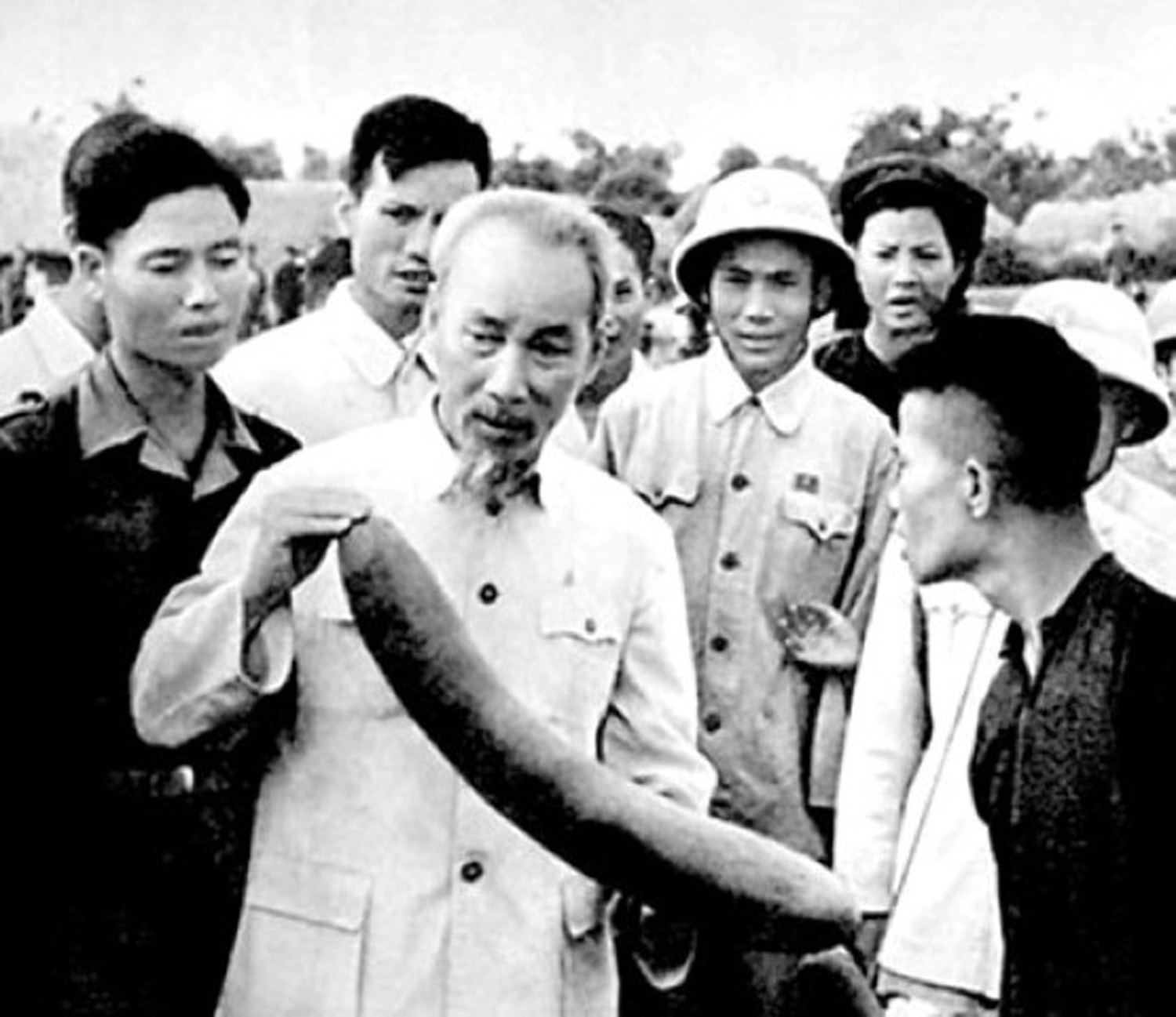
After a good night's sleep, Uncle leaned on a bamboo stick that his guard had just prepared. He gave the order: "Come on, Uncle and I, let's climb the mountain together!" When crossing the stream, many people quickly placed rocks for Uncle to walk on, but before he could finish, Uncle rolled up his pants and waded across. Up to Thach Ban, Uncle looked far away to Kiep Bac, Luc Dau Giang, where there was a temple to worship Tran Hung Dao, where our army had defeated the Yuan-Mongol several times. Uncle's silver hair fluttered in the gentle wind against the blue sky, making him look like a fairy. He called everyone to take souvenir photos and said: "At least it's a souvenir that Uncle and I have reached our destination. Now Uncle and you are all satisfied."
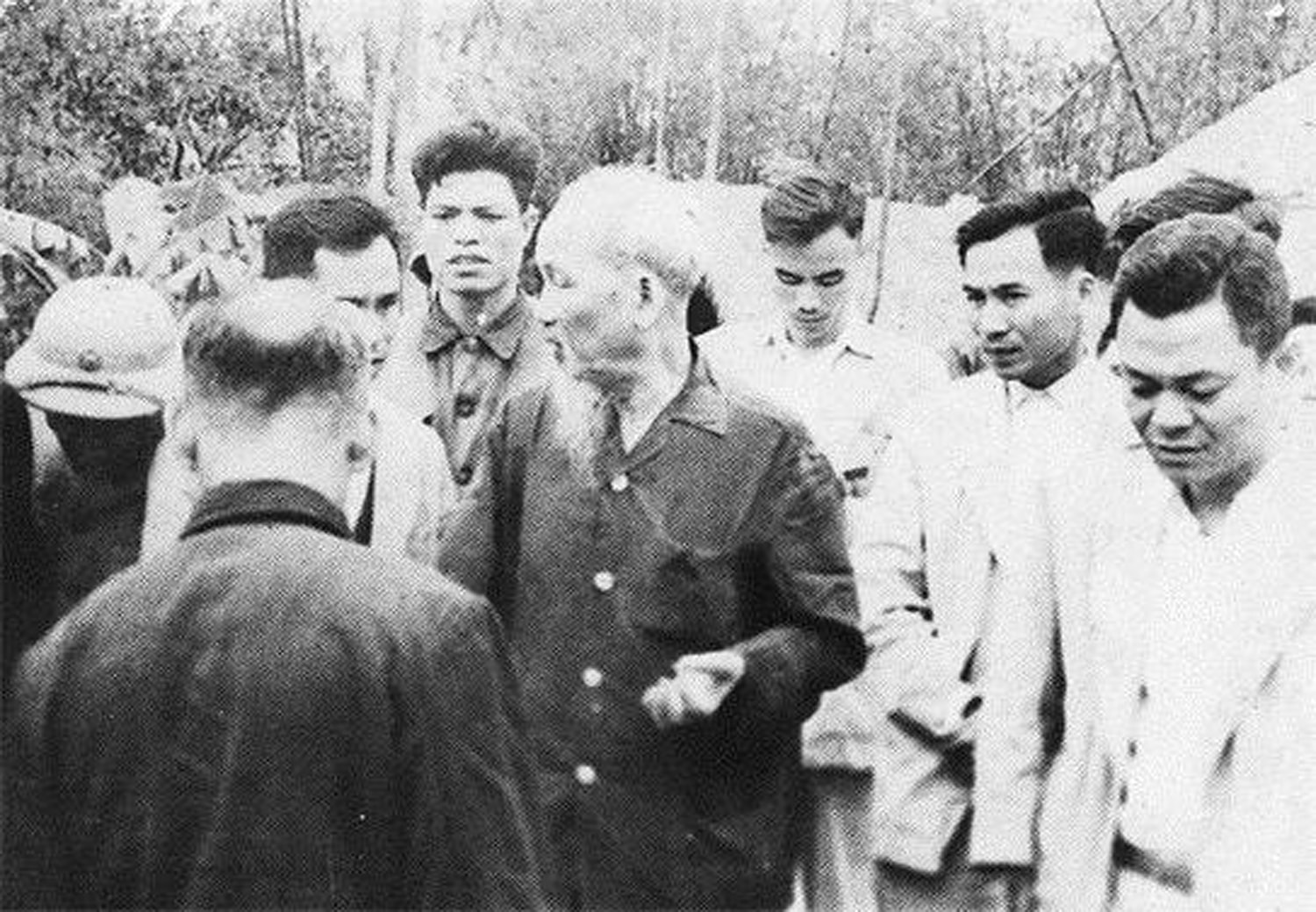
During this trip, journalist Me Hung Doan took Uncle Ho's demeanor and words to heart, very useful for journalism: work is more important than eating and sleeping; to know clearly, one must see and hear.
On the way up the mountain, Uncle Ho said: "The scenery is so beautiful, but you say there is nothing! You have to go there to see it for yourself"./.

.jpg)

